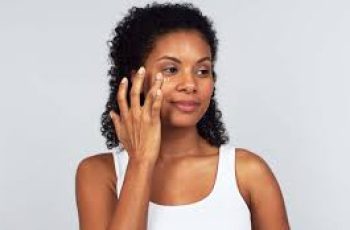The JNK Gene and Skin Health
Activating the JNK gene can speed skin aging. Activation of the JNK gene (c-Jun N-terminal kinases) plays a critical role in stress response pathways in cells, including those in the skin. When the JNK pathway is activated, it can lead to several cellular responses that are detrimental to skin health and appearance.
The goal of an antiaging skincare routine is to prevent activation of the JNK gene. (It is pronounced like “junk”).
Why the JNK Gene Causes Skin Aging
Below I give a simplified explanation of why the activation of JNK is considered unfavorable, especially in the context of increasing collagenase activity and causing skin to age.
Promotion of Collagen Breakdown
JNK activation can increase the production of collagenase, an enzyme responsible for the breakdown of collagen. Collagen is a crucial protein that provides structure, strength, and elasticity to the skin. By increasing collagenase levels, JNK activation leads to accelerated degradation of collagen, contributing to the loss of skin firmness and the development of wrinkles.
Fortunately, there are many common ingredients that stimulate collagen synthesis. Some examples of ingredients that stimulate collagen are: salicylic acid, Vitamin C, growth factors, and many more.
Make sure to take the Baumann Skin Type Quiz for free today to make sure you only get collagen stimulating products that are right for your specific skin type!
Contribution to Inflammation:
The JNK pathway is also involved in promoting inflammatory responses. Chronic inflammation can further damage skin structures, including collagen and elastin fibers, exacerbating aging signs and other skin conditions. If you have inflammation concerns, due to the JNK gene or otherwise, make sure to check out this blog all about thescience of inflammation! You can also check out this full dictionary of anti-inflammatory ingredients!
Enhancement of UV Damage
Exposure to UV radiation is a known activator of the JNK pathway. The resulting increase in collagenase contributes to the breakdown of collagen faster than it can be replaced, particularly following UV exposure. This mechanism is a key factor in photoaging, where the skin ages prematurely due to sun exposure
What is the JNK Gene?
The JNK gene (c-Jun N-terminal kinases) refers to a family of protein kinases that play a significant role in regulating cellular responses to stress. These enzymes are part of the mitogen-activated protein kinase (MAPK) family, which includes several pathways that transmit signals from the cell surface to the nucleus, affecting a wide range of cellular processes including proliferation, differentiation, survival, apoptosis (programmed cell death), and stress responses.
JNKs are activated in response to various stressors, such as UV radiation, reactive oxygen species (ROS), cytokines, and heat shock. Upon activation, JNKs translocate to the nucleus where they phosphorylate their target substrates, including the transcription factor c-Jun, part of the activator protein-1 (AP-1) complex. The AP-1 complex then regulates the expression of genes involved in cell death, survival, and inflammation, among other processes.
The role of JNKs in the skin, particularly in relation to UV exposure and oxidative stress, is critical. Activation of JNK pathways can lead to the upregulation of enzymes that degrade collagen, such as matrix metalloproteinases (MMPs), thereby contributing to the aging process and the development of conditions like wrinkles and loss of skin elasticity. Moreover, JNK activation is associated with inflammatory responses in the skin, which can exacerbate damage and promote aging and skin diseases.
Understanding the function and regulation of JNK is important in dermatology and skincare, as targeting this pathway could offer therapeutic strategies for treating various skin conditions, including aging, inflammation, and cancer.
DQH Can I use salicylic acid first and then vitamin C?
It’s easy to create a skincare routine, but knowing how to use it is another thing entirely. In most cases, if you’re not getting the desired skin results, it could be due to the layering of conflicting ingredients. So, is it possible that salicylic acid and vitamin C are such ingredients? Or are these active ingredients the duo that’s been missing from your skincare routine? If you want answers, stick around because today we are going to explain the benefits of salicylic acid and vitamin C and how they can be used in your daily life.
What are the benefits of salicylic acid for skin?
Salicylic acid is one of the most commonly used beta hydroxy acids and is favored by many people with oily, acne-prone skin. This acid is derived from willow bark, and unlike its water-soluble relatives (called alpha-hydroxy acids), salicylic acid is oil-soluble, which means it can penetrate deeper into the lower layers of the skin. Once it reaches the lower layers, it can help unclog pores of excess sebum, dirt, bacteria, debris, and impurities. This results in clearer skin tones and greater definition.
Not only does salicylic acid benefit the underlying layers, but the outer surface of the skin benefits as well. When applied to the skin, salicylic acid removes the buildup of dead skin cells. This is accomplished by breaking the bonds that hold dead cells to the surface. Over time, this can cause the complexion to look dull and prone to acne, blackheads, and other blemishes.
If you’d like to learn more about salicylic acid and how it can improve your skin, check out this dedicated blog post from a beauty insider.
What are the benefits of vitamin C for skin?
Vitamin C is considered one of the most powerful antioxidants, which means it is very effective at fighting free radicals and preventing them from causing further skin damage. Examples of free radicals include pollution, central heating, UV rays and harsh climate. They attack proteins, fats and cell membranes as soon as they come into contact with the skin, causing signs of premature aging such as fine lines and wrinkles as well as hyperpigmentation, flaky patches of skin and loss of elasticity.
Many people usually prefer to use vitamin C in their morning routine as this ingredient gives the complexion a radiant glow. You’ll also find that vitamin C can target areas of hyperpigmentation, plumping the skin and reducing the appearance of fine lines and wrinkles.
The thing about vitamin C is that there are a lot of outdated studies going back to the 1950s that describe vitamin C as an unstable skin component. Thanks to improvements in modern technology, this is no longer the case as all products now contain a stable form of vitamin C.
Visit The Beauty Insider to learn more about vitamin C. So please check out our blog post.
Can I use salicylic acid first and then vitamin C?
Yes, you absolutely can. In fact, it’s thought that using salicylic acid before using vitamin C ensures it penetrates faster and works faster.
This is an efficient way to utilize two power sources, and the reason has to do with pH. For example, the skin’s natural pH is about 4.7, making it slightly acidic. Salicylic acid and vitamin C are also both acidic, and you’ll find that vitamin C is absorbed quickly into the skin. Therefore, using salicylic acid beforehand can increase the acidity of the skin and allow vitamin C to penetrate into the skin faster.
While this is considered an effective way to combine two powerful ingredients, you need to be aware of your skin type and how it reacts to certain active ingredients. Even people with perfect, normal skin can experience skin sensitivity and irritation. Therefore, always consult a doctor or dermatologist before using any new products on your skin.
It’s also important to follow skin application rules. In this case, you need to use the product correctly to ensure you get the best results for your skin. If you’re not sure what I mean, the basic rule for skin is to start with the thinnest consistency and work your way up to the thickest consistency. This prevents a barrier from forming on the surface, preventing other active ingredients from penetrating the skin.
Can I use salicylic acid at night and vitamin C in the morning?
Yes, absolutely, this is considered the most effective way to get returns without any adverse side effects. This is because there is enough time between applications to ensure that the skin’s pH levels return to balance.
You’ll also find that Vitamin C is rich in antioxidants and is perfect for use in the morning to ensure your skin is protected and looking its healthiest. Due to the small size of salicylic acid molecules, it is an acid that is able to reach the deepest parts of the skin. While this is effective at keeping skin clear, it also increases the risk of irritation and photosensitivity. Therefore, many people prefer to use powerful BHAs in their evening routine without exposure to UV rays, pollution, or harsh weather.
Warning: If you avoid using sunscreen every day, none of these ingredients will do what your skin needs. The combination of chemical peels and powerful ingredients increases the risk of further damage to the skin’s surface. Use SPF 50 every day to keep your skin protected and your lipid barrier healthy, even on cloudy days, keeping your skin in top condition.



